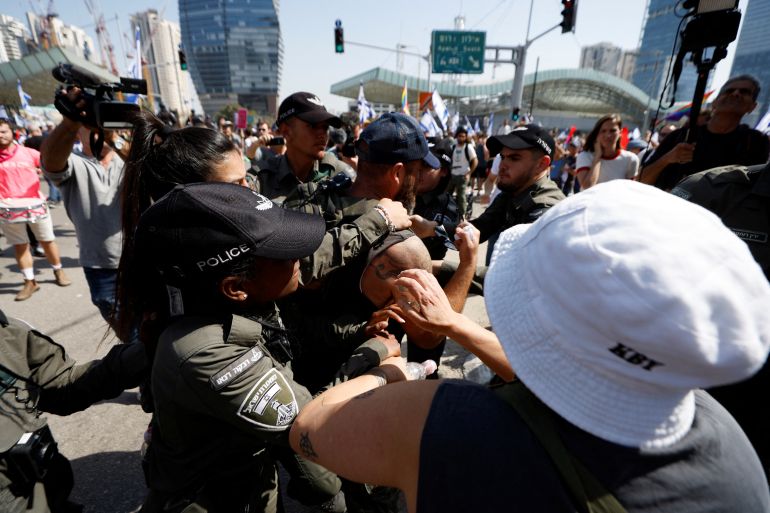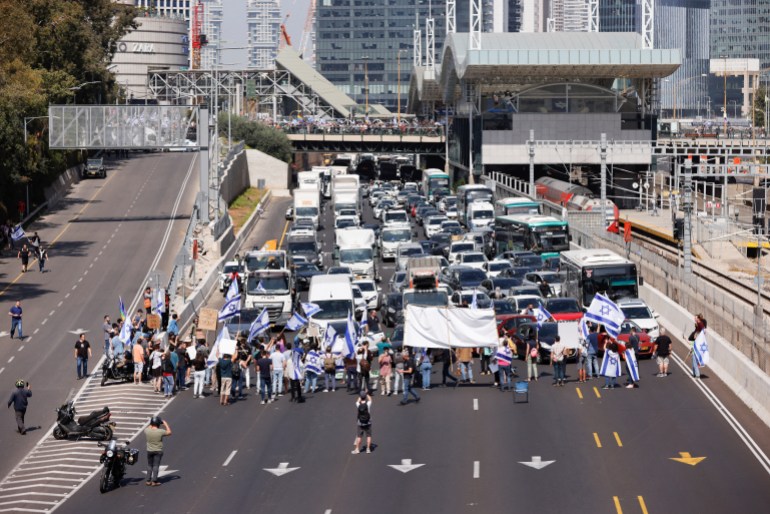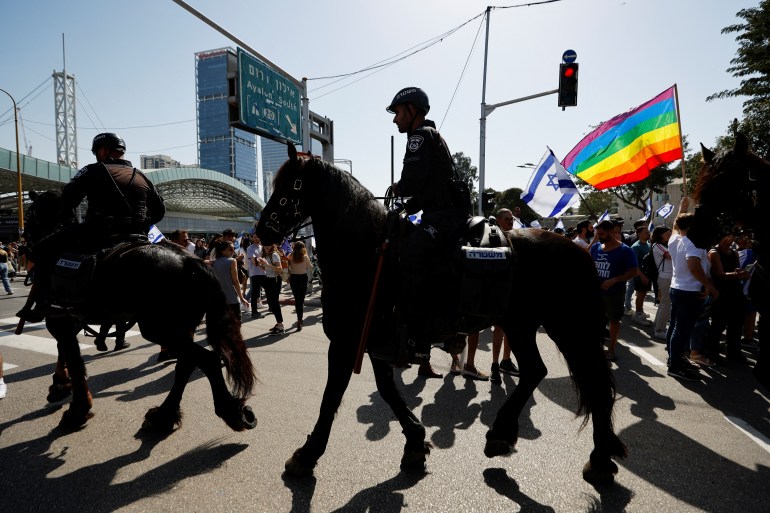Israeli police fire stun grenades on pro-judiciary protests
Demonstrations are expected to intensify after what protest organisers dub a day of disruption against the government’s plans to reform the judiciary.

Israeli police have fired stun grenades in Tel Aviv as scuffles broke out across the country amid a “day of disruption” protest as lawmakers ploughed ahead with judicial changes that opponents see as a threat to democracy.
“Israel is not a dictatorship, Israel is not Hungary,” protesters blocking the main highway from Tel Aviv to Jerusalem shouted on Wednesday, waving blue and white Israeli flags.
Keep reading
list of 4 itemsWhat you need to know about Israel’s judicial reforms
Israel passes law allowing deportation of Palestinian prisoners
Thousands protest as Israeli parliament debates judicial reforms
Police on horseback tried to stop demonstrators breaching barricades as traffic piled up.
Live footage showed police dragging protesters off the road as demonstrators called out “shame” and “we are the majority and we are out on the streets”.
At least nine people were arrested, police said.
Demonstrations were expected to intensify in what protest organisers have dubbed a day of disruption.
Israel’s far-right National Security Minister Itamar Ben-Gvir said he would not allow “anarchists” to block roads.

Prime Minister Benjamin Netanyahu in a tweet said his government would not “accept violence against police officers, roadblocks and flagrant violation of state laws”.
“The right to protest is not the right to anarchy,” he added.
Netanyahu’s far-right coalition government proposed what it has described as a reform of the judiciary in January.
It includes giving governing coalition lawmakers decisive sway in picking judges and limits the scope of the Supreme Court to strike down legislation or rule against the executive.
In parliament, the Knesset’s Constitution, Justice and Law Committee gave initial approval to more proposals in the plan, in a vote boycotted by opposition lawmakers.
The legal overhaul has sparked an unprecedented uproar, with weeks of mass protests, criticism from legal experts and rare demonstrations from army reservists who have pledged to disobey orders under what they say will be a dictatorship after the overhaul passes.
Business leaders, the country’s booming tech sector and leading economists have warned of economic turmoil under the judicial changes.

The plan has yet to be written into law, but it has already affected the Israeli shekel and drawn concern from some Western allies about the health of democracy.
“Slow down a little a bit, maybe bring people together, try and build some consensus,” United States Ambassador Tom Nides said at Tel Aviv University’s conference of the Institute for National Security Studies on Tuesday.
Al Jazeera’s Imran Khan, reporting from West Jerusalem, said Netanyahu’s coalition has not reached out to the opposition to try and bring them on board over the issue.
“In fact, it’s just ignoring them. They’re trying to push this bill through themselves,” he added.
Netanyahu, on trial on corruption charges that he has denied, has said the changes will restore the balance between the branches of government and boost business. Economists and legal experts have said they will isolate Israel and wreak havoc on the economy.
Polls have shown the plan is unpopular with most Israelis who would prefer a compromise be reached.